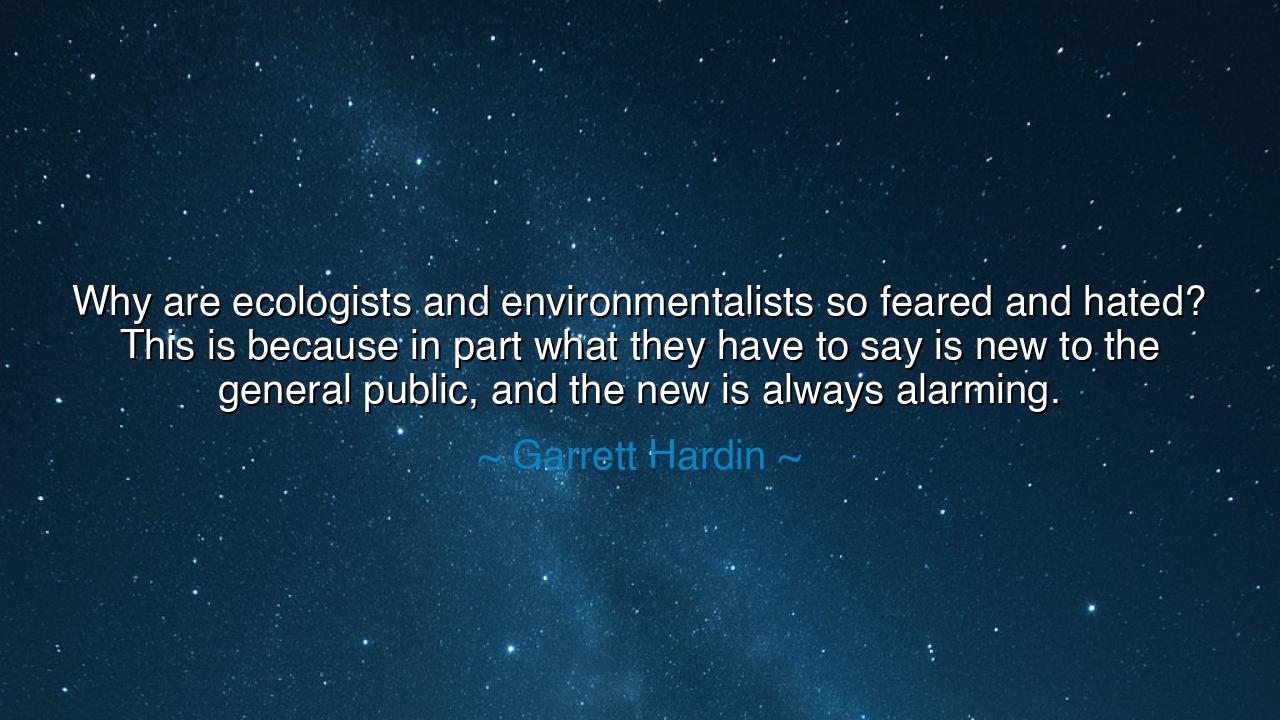
Why are ecologists and environmentalists so feared and hated?
Why are ecologists and environmentalists so feared and hated? This is because in part what they have to say is new to the general public, and the new is always alarming.






In the vast chronicles of human thought, there are voices that rise not in comfort but in warning — voices that speak truths so sharp they cut through illusion. Among such voices was Garrett Hardin, a thinker who gazed into the heart of our relationship with the Earth and saw both its splendor and its peril. When he declared, “Why are ecologists and environmentalists so feared and hated? This is because in part what they have to say is new to the general public, and the new is always alarming,” he spoke not merely of environmental science but of the eternal struggle between truth and denial. His words echo through time as a lament for the blindness of mankind — for it is the fate of those who bring new light to be despised by those who live comfortably in the dark.
From the dawn of civilization, humankind has feared the new. When the prophets of old spoke of change, they were met with stones and fire. When the astronomers dared to say that the Earth was not the center of the universe, they were silenced and shamed. So it is with the ecologists and environmentalists — those who, in modern times, have become prophets of another kind. They warn that the seas rise, the forests vanish, the air grows thin, and the soil turns to dust beneath our unthinking feet. Yet many turn from them with anger, not because their words are false, but because they are too true. To hear them is to be forced to reckon with guilt; to listen is to admit that our way of life is unsustainable.
The origin of Hardin’s insight lies in his own age — the twentieth century — when humanity, having mastered machines and energy, began to wound the very Earth that sustains it. In his famous essay, “The Tragedy of the Commons,” Hardin warned that when all take from a shared bounty without restraint, that bounty is doomed to vanish. He spoke not in poetry, but in the hard prose of logic, and yet his message was spiritual: we are devouring our inheritance, and unless we change, there will be nothing left for those who follow. Still, many mocked him. Politicians called him alarmist; the comfortable called him pessimistic. But time, the greatest teacher, has proven his prophecy.
Consider the story of Rachel Carson, whose book Silent Spring awakened a sleeping world to the dangers of pollution. She spoke softly, yet her words thundered against the halls of power. Her warnings against pesticides were ridiculed by industry; she was accused of being hysterical, unpatriotic, and anti-progress. But she did not falter. And when the rivers began to choke, when the birds no longer sang in spring, her truth became undeniable. Through her courage, nations changed their laws, and countless lives — human and non-human — were spared. Thus, like Hardin, she proved that those who are feared and hated are often the ones who love humanity most deeply.
To hate the bearer of truth is to cling to illusion. The new that alarms us is often the very wisdom that could save us. The ancients taught that the mind must be broken open like a seed before growth can begin. The ecologist’s cry is not a curse but a call — a call to awaken from the dream of endless consumption, to see that the Earth is not a slave but a mother, not a warehouse but a living temple. Yet, as Hardin said, such awakening terrifies the multitudes, for it demands humility, restraint, and change — virtues long forgotten in the fever of modern life.
My children of the future, learn from this: those who speak uncomfortable truths should not be cast out but listened to. The wise do not fear the new; they study it, test it, and learn to walk with it. When someone warns that the rivers are poisoned, do not laugh — go and see the river yourself. When a teacher tells you the forests are dying, do not argue — plant a tree, and feel the soil with your hands. Let knowledge be your courage, and curiosity your shield.
And so, let Hardin’s words be remembered as a torch in the fog. The fear of the new is the mark of stagnation, but the embrace of truth, however painful, is the path of renewal. Let us be a generation that welcomes the voices of the Earth, not with anger but with reverence. For to heed their warning is not to lose — it is to live.
Therefore, the lesson is simple yet profound: do not silence those who speak for the planet; join them. Listen, learn, and act. Reduce what you waste. Restore what you have harmed. Teach others to walk gently upon the Earth. For one day, when our descendants look back, may they say that when the truth came to us — frightening and new — we did not turn away, but answered with courage, and in doing so, redeemed ourselves.






AAdministratorAdministrator
Welcome, honored guests. Please leave a comment, we will respond soon